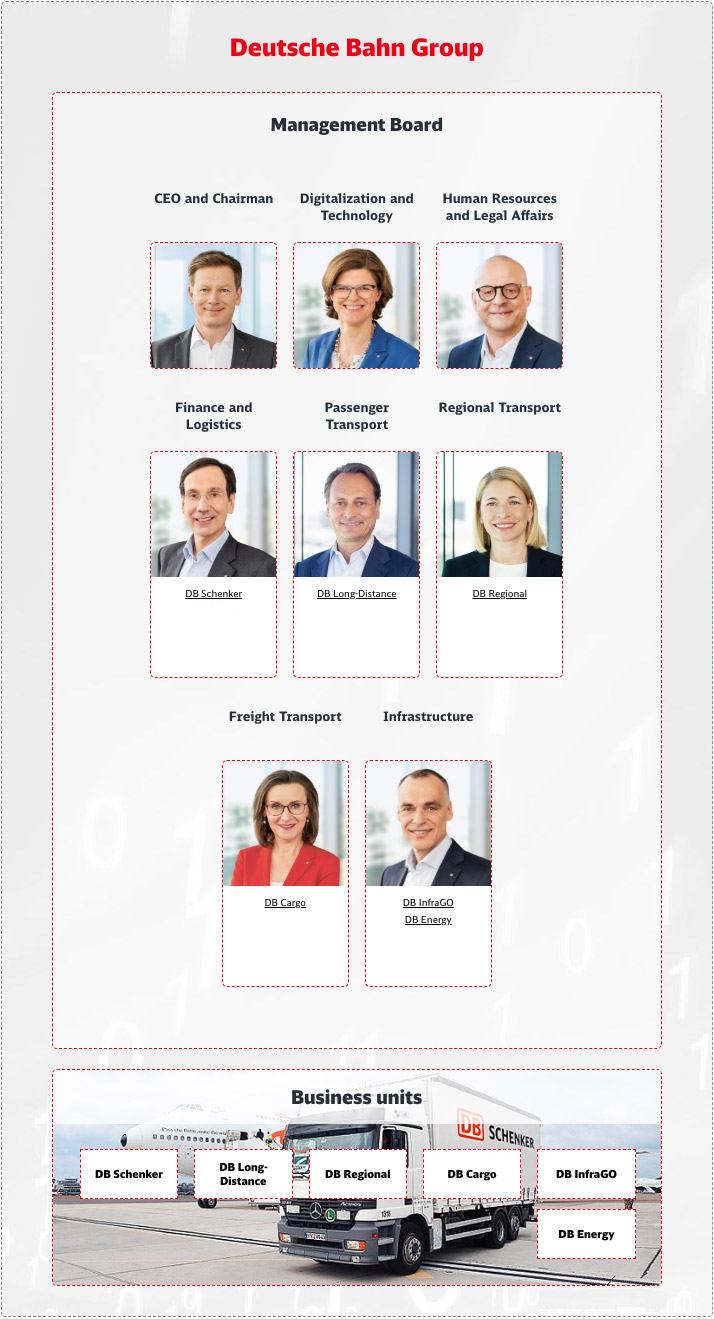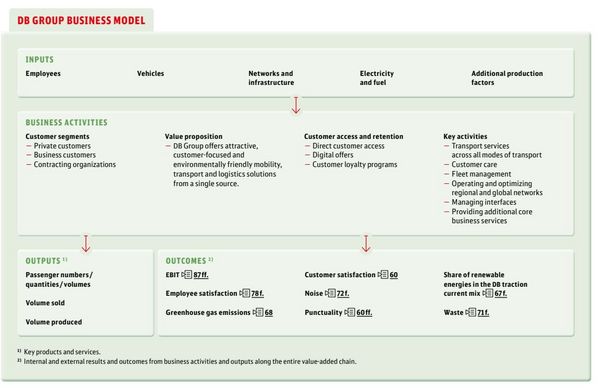About us
DB Group is a leading provider in the mobility and logistics sector, and primarily consists of the integrated rail system and the two major international subsidiaries DB Schenker and DB Arriva. The integrated rail system includes our passenger transport activities in Germany, our rail freight transport activities, the operating service units, and the rail infrastructure companies (RIC) in Germany. DB Group, with its head office in Berlin, employs about 340,000 people. Our business operations are focused on rail transport in Germany.
Our primary concern is the shift from road traffic to climate-friendly rail. To this end, we rely on integrated operation of transport and railway infrastructure, the economically and environmentally intelligent linkage of all modes of transport, as well as cooperation in German and European networks. We operate Europe’s longest rail network and are also one of the largest energy suppliers in Germany. Our national and international services give us leading market positions in our relevant markets.
Deutsche Bahn AG (DB AG) is the parent company of DB Group. It has been a stock corporation under German law since it was founded in 1994 and accordingly has a dual management and control structure comprising a Management Board and a Supervisory Board. The changes in the composition of the Supervisory Board and the Management Board are presented in the report of the Supervisory Board. The Federal Government is the sole owner of DB AG.
In DB Group, DB AG runs all business units as an operating management holding company and supports the business units through various central governance functions and DB Business Services. In addition, DB Operational Services primarily provide services to intra-Group customers as legally independent shareholdings of DB AG. DB Group RIC are legally independent companies with separate balance sheets and statements of income, and thus fulfill all unbundling requirements under European and national law. There is also a functional unbundling, which guarantees the independence of decisions by DB Netz AG in relation to infrastructure access and charges. Reliability and stability form the basis of high-quality infrastructure. The essential cornerstones for profitable business are sustainable financing of the existing infrastructure and its expansion as required. The Performance and Financing Agreement (LuFV) makes a significant contribution to ensuring the maintenance of the existing network.
DB Group focuses on the business operations of the integrated rail system.
Given the importance of Strong Rail for Europe, Europe will continue to be the main field of action for DB Group in future. Large international investments are measured by the contribution to the Strong Rail:
- Strategically relevant subsidiaries such as DB Schenker will therefore continue to be held as financial investments. Joint operational initiatives focus on achieving synergies within the integrated network.
- DB Arriva only accounts for a small amount of operational and strategic added value in Strong Rail. There are currently no significant synergies with the integrated rail system on the customer, production or product side. The Group therefore still intends to sell the company.
Organizational structure
Deutsche Bahn AG (DB AG) is the parent company of DB Group. It has been a stock corporation under German law since it was founded in 1994 and accordingly has a dual management and control structure comprising a Management Board and a Supervisory Board. It is wholly owned by the Federal Republic of Germany (Federal Government).

DB Group offers attractive, customer-focused and environmentally friendly mobility, transport and logistics solutions and networks from a single source. We utilize the possibilities of digital technologies to improve our operational and administrative processes, to consistently further develop offers for the customer, to integrate new services, and to simplify the customer interface. The integrated rail system μ55 is at the heart of our business activities. In addition, we are gradually expanding our business portfolio in the area of mobility and logistics in order to meet our customers’ needs more effectively and respond to new market demands.
- Our passenger transport activities have a broad base. In addition to bus and rail transport, this also includes intelligent links with other modes of transport such as cars and bicycles, but also with new forms of mobility that complement the core business and enable door-to-door mobility. We offer long-distance rail passenger transport within Germany and into neighboring countries. DB Arriva has a Europe-wide presence in regional and local transport, enabling participation in the increasing market potential in opening bus and rail transport markets.
- Our business activities in the freight transport and logistics market were moved to an international platform very early on. DB Cargo and DB Schenker operate predominantly in the business-to-business segment. We offer our customers industry-specific solutions in European rail freight transport and global land transport, in global air and ocean freight, and in global contract logistics. Covering all relevant modes of transport allows us to offer complex combined logistics services and to make use of synergies in our networks for the benefit of our customers.
There are five key success factors in the development of DB Group, which are a central component of our business model.
- Corporate social responsibility: As a federal provider of mobility and logistics solutions, DB Group has a major responsibility for the future of our country. As the backbone of the green and networked mobility of the future, rail plays a key role for our country: it helps to achieve climate targets, it promotes integration and quality of life, and it strengthens the business location, as well as empowering Europe’s people and economy. Society as a whole benefits from strong rail transport. We consistently focus our business operations on achieving Strong Rail and prioritize our activities along the value-added chain to that effect.
- Entrepreneurial approach to business: In the course of the German rail reform, DB Group has established itself as a commercial enterprise. This includes, in particular, the establishment of a modern and efficient organization and the establishment of value-oriented corporate management.
- Integrated Group: As a system integrator in Germany, we are optimizing the integrated rail system as a whole. In doing so, we are fulfilling our important role as a technological pioneer. The integrated Group structure enables us to achieve positive synergies and align our infrastructure to support efficiency, market orientation and profitability. The digitalization of rail can only be successfully developed and implemented in the integrated rail system. Our customers also benefit from the integrated Group. Thanks to the economically, environmentally and technologically intelligent links between different modes of transport, we offer our customers door-to-door mobility and logistics solutions from a single source.
- Europe as the field of action: Strong Rail reaches beyond Germany. As the geographical and economic heart of Europe, Germany has a special responsibility for the future of the continent. Given the importance of a strong rail system for Europe, Europe will continue as our main field of action in future. In order to take into account the customers’ need for cross-border solutions, we continue to position ourselves at European level with our passenger transport activities. Thanks to the European and worldwide orientation of our freight transport and logistics activities, we offer our customers the access they need to global networks.
- Digitalization: We use the technologies and methods of digitalization to offer customers an attractive range of products. This means, on the one hand, that we are incorporating new transport offers into our product portfolio, such as on-demand mobility, and establishing new platforms for our customer interfaces. On the other hand, we support our internal processes with technologies such as artificial intelligence (AI), so that we can continue to offer customers a reasonable price level with efficient processes.









